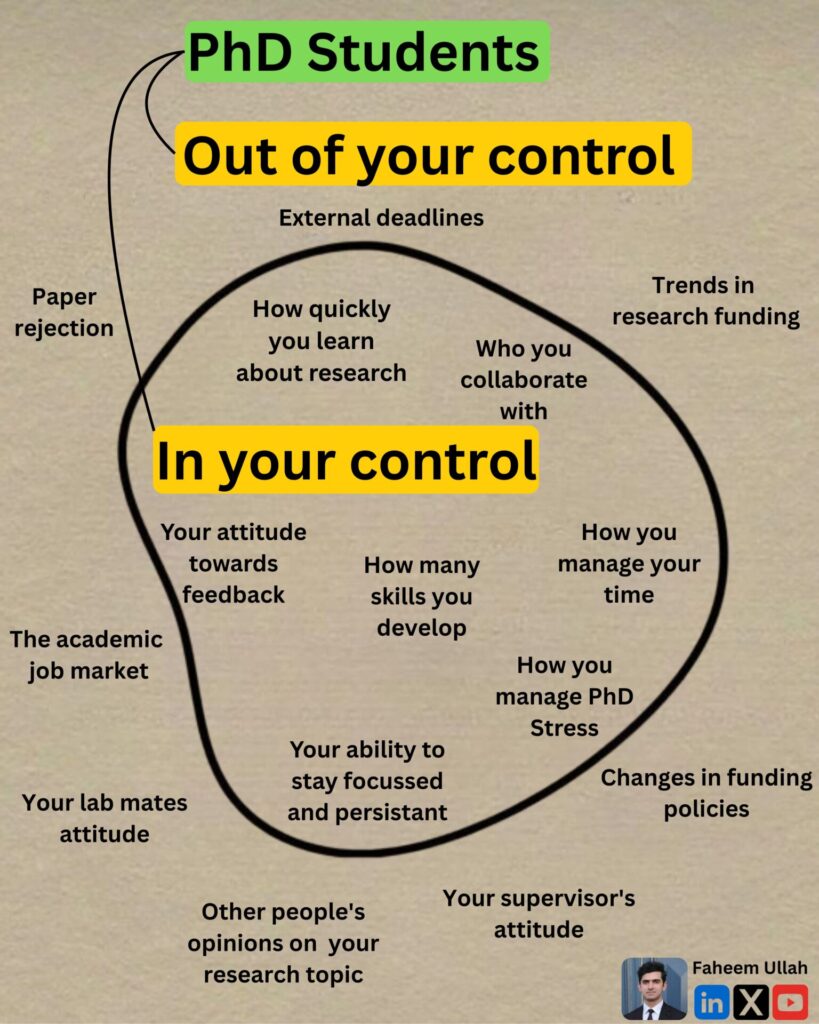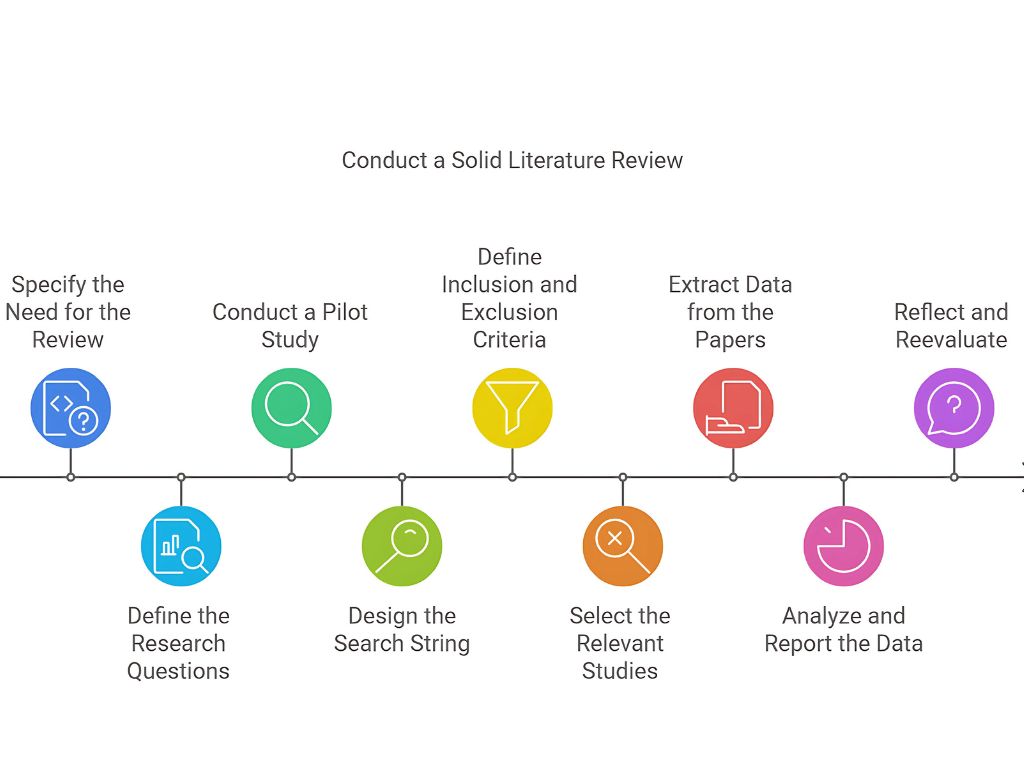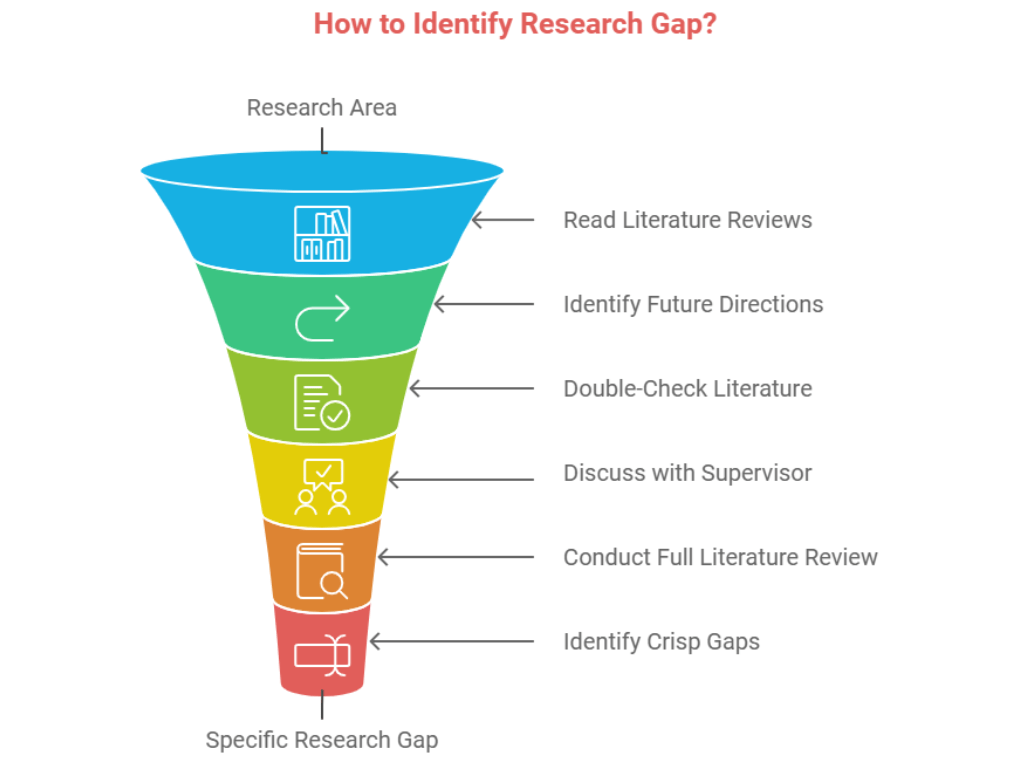
PhD Students – How to convert a paper into a poster in seconds?
Try SciSpace Agent
It converts your research papers into a poster in seconds.
It works in 3 simple steps
- Upload the PDF of your research paper
- Specify your poster requirements (if any) in a prompt
- Download your poster in PPT form
Doing a PhD is one of the most exciting, yet toughest journeys you can take. Every day comes with new challenges. Some of these challenges are within your control, while others are not. Knowing the difference is powerful.
When you learn to focus on what you can control and let go of what you cannot, you save energy, reduce stress, and make progress faster.
In this post, let’s talk about the two sides of your PhD life:
- Out of your control: things you cannot change, no matter how hard you try.
- In your control: things that depend on your choices, effort, and mindset.
By the end of this post, I want you to reflect: Am I spending too much energy on things I cannot change? Or am I investing my focus on the things that are truly in my hands?

Out of Your Control
During your PhD, you will face many situations that are completely outside of your influence. These can frustrate you. They can even make you feel stuck. But once you accept that you cannot change them, you will feel lighter and more focused.
Here are some key examples:
1. External Deadlines
Sometimes conferences or funding bodies set deadlines. You cannot change them. If a paper deadline is tomorrow, it won’t be extended just for you. The only thing you can do is plan better next time.
2. Paper Rejections
Every PhD student faces rejection. Top journals and conferences reject many papers, even from famous professors. You cannot control reviewers’ opinions. What you can control is how you respond: revise, learn, and resubmit.
3. The Academic Job Market
Jobs depend on economy, funding, and institutional needs. You cannot change the market situation. But you can improve your skills to stay competitive.
4. Your Lab Mates’ Attitude
Some colleagues may be supportive, others may be competitive or indifferent. You cannot change their personalities. You can only decide how you interact with them.
5. Your Supervisor’s Attitude
Supervisors have their own styles—some are helpful, some are distant, and some are very demanding. You cannot completely control how they behave. But you can control how you use their feedback.
6. Others’ Opinions on Your Topic
Friends, family, or even other researchers may not see value in your topic. That is fine. You cannot control their opinion. What matters is your belief in your research.
7. Changes in Funding Policies
Sometimes governments or universities cut or change funding. These decisions are beyond your power. You cannot plan for them in advance.
8. Trends in Research Funding
Some areas suddenly get more money. Others lose attention. For example, AI may get funding today while another area gets ignored. This trend is not in your hands.
In Your Control
Now let’s talk about what is truly in your hands. This is where you should spend your energy. These choices will decide whether your PhD is painful or successful.
1. How Quickly You Learn Research
You may not be the smartest student, but you can control how much time and focus you give to learning. Read papers regularly. Take notes. Discuss ideas. The more effort you put in, the faster you grow.
2. Your Attitude Towards Feedback
Feedback can be tough. Reviewers or supervisors may criticize your work. You can choose to take it personally—or use it as fuel to improve. Your attitude makes all the difference.
3. How Many Skills You Develop
A PhD is not just about your thesis. It’s also about building skills. Writing, coding, presenting, networking, managing projects—these skills will serve you for life. You control how much you invest in them.
4. Your Ability to Stay Focused and Persistent
Distractions are everywhere. Netflix, social media, or even self-doubt can eat your time. But you control your persistence. Keep showing up, even on bad days.
5. How You Manage PhD Stress
PhD stress is real. You cannot remove it completely. But you can manage it. Exercise, meditation, breaks, and talking to friends can help. Managing stress is always in your control.
6. How You Manage Your Time
You have 24 hours, just like everyone else. Time management is a skill you can master. Use calendars, task lists, and routines. Small daily progress adds up.
7. Who You Collaborate With
You may not choose your supervisor, but you can choose collaborators. Build a network. Work with people who support you and bring value to your research.
Why This Matters
Many PhD students waste energy worrying about things they cannot control. For example:
- “What if my paper gets rejected?”
- “What if funding dries up?”
- “What if the job market is bad?”
These worries don’t help. They only drain your energy.
But when you shift your focus to things you can control, you start to feel empowered. You begin to see progress. You create opportunities instead of waiting for them.
A Simple Exercise
Take a piece of paper. Draw two circles like in the image above:
- Label one “Out of my control.” Write down all the things you worry about but cannot change.
- Label the other “In my control.” Write down the things you can take action on today.
Now, look at your lists. Every time you catch yourself stressing over something from the first circle, remind yourself: “This is not in my control.” Then ask: “What can I do right now from the second circle?”
Final thoughts
A PhD is not just about producing research. It is about learning how to manage uncertainty. It is about building resilience.
The sooner you accept what is out of your hands and focus on what is in your hands, the better your PhD journey will become.
So, PhD students, remember:
- Stop wasting energy on things you cannot change.
- Invest your energy in what you can control.
- Keep moving forward, even on tough days.
That is the mindset that will take you to success.
Don’t forget to read: AI Tools for Literature Review
Best of Luck..




